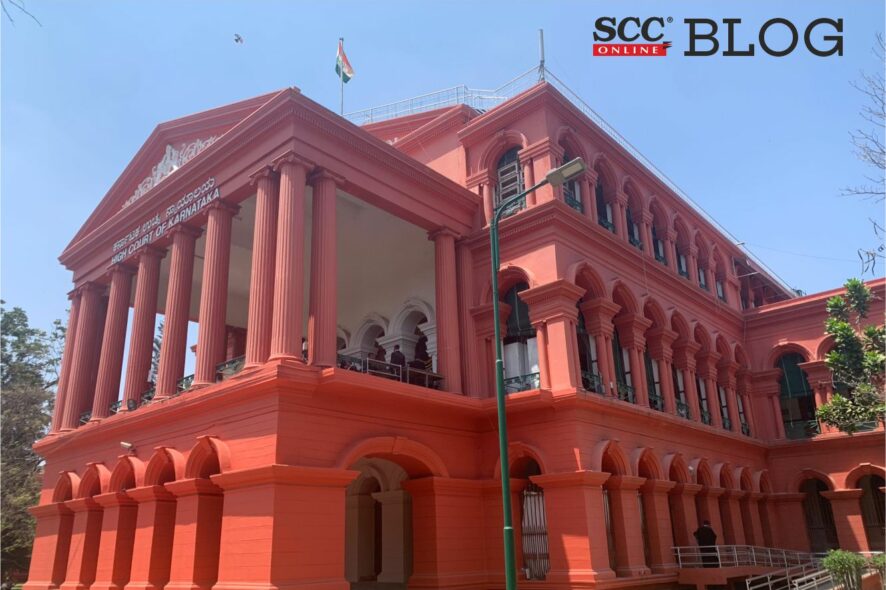Karnataka High Court: A Division Bench of Alok Aradhe and J M Khazi, JJ. dismissed the appeal and quashed the impugned judgment directing the appellants to determine the compensation and pay the same to respondents.
The facts of the case are such that the original respondent 1 viz., Narayana Reddy, owner of an agricultural land, wherein the said land, as well as several other lands, were required for formation of a layout between Banaswadi Road and Hennur Road commonly known as HRBR Layout. A preliminary notification dated 21-03-1977 and a final notification dated 14-05-1980 was issued. The father of original petitioner filed a writ petition seeking to give effect to the resolution for de notification of the land which was thereby dismissed. Then, again a writ petition was filed challenging the validity of the notifications which was again dismissed. The original petitioner again filed a petition challenging the notifications without disclosing the factum of filing two previous writ petitions by the father. The impugned notifications were quashed and the writ petition was allowed holding that the petition does not suffer from delay and laches as the scheme was not substantially implemented as required under Section 27 of the Bangalore Development Authority Act, 1976 within five years from the date of the final notification and therefore, the scheme has lapsed. Thus, instant appeal was filed.
Counsel for the appellant submitted that the original petitioner was guilty of suppression of facts and the writ petition filed by the original petitioner suffered from delay and laches and the writ petition was barred by res judicata. It was also contended that the original petitioner cannot claim any benefit on the principle of negative equality and no legal right accrues to the original petitioner even if in some cases in which adverse orders have been passed against the appellants, it may not have preferred an appeal. However, it is fairly submitted that the land owners are entitled to just and fair compensation.
The Court relied on judgment Krishnamurthy v. Bangalore Development Authority, 1995 SCC OnLine Kar 498 wherein it was observed “It is also pertinent to note that proceeding under Section 27 of the Act would lapse only if two conditions are satisfied viz., failure to execute the scheme by dereliction of statutory duties without justification and substantial execution of the scheme depending upon the scheme.”
The Court observed that it is trite law that principles of constructive res judicata and res judicata apply to writ proceeding. In the instant case, the original petitioner who claims title in respect of property in question through his father is bound by the decision of previous writ petition and cannot be permitted to agitate the validity of the impugned notifications again on the principle of res judicata Thus, the challenge to the aforesaid notification is barred by principles of res judicata.
The Court further relied on judgment K. Jayaram v. Bangalore Development Authority, 2021 SCC Online SC 1194 and observed that the petitioner is guilty of suppression of material facts and has not approached the court with clean hands. Therefore, the discretionary jurisdiction under Article 226 of the Constitution of India, which is equitable and extraordinary cannot be exercised in favour of the original petitioner.
The Court relied on Chandigarh Administration v. Jagjit Singh, (1995) 1 SCC 745, and opined that even if some similarly situated persons have been granted benefit inadvertently or by mistake, the same does not confer any legal right on the original petitioner to claim similar relief. Therefore, even if some land owners may have been granted the benefit, inadvertently by the authority, the same would not confer any legal right on the original petitioner to claim the similar benefit.
The Court directed that the “appellants shall take steps within a period of six weeks to determine the compensation payable to respondents 1(a) to 1(d) and shall make payment of the amount of compensation as is permissible in law.” [Bangalore Development Authority v. Principal Secretary, Revenue Department W.A. No. 4121 of 2017, decided on 24-05-2022]
Appearances-
For appellants- Mr Gurudas S Kannur and Gouthamdev C. Ullal
For respondents- Mr Rajashekar and S. Suresh Desai






